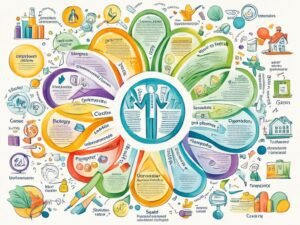Almost 50% of the population deals with depression. It affects women more than men. The right help is key to manage it. If left untreated, depression can lead to issues like anxiety. Some people use drugs or alcohol to cope.
A depression treatment center helps by offering therapy and meds. You can stay there or go home for treatment. Therapy types include CBT, ACT, DBT, family, and group. You might also do things like meditation or art. SSRIs help with medication. Choosing the best center is important for your mental health.
Key Takeaways
- Depression is a widespread mental health condition that affects almost half the population, with women disproportionately impacted.
- A depression treatment center can provide comprehensive care, including therapy, medication, and holistic approaches, to help manage symptoms and support recovery.
- Inpatient treatment involves staying at the facility, while outpatient care allows you to live at home and attend scheduled therapy sessions.
- Finding the right depression treatment center is crucial for developing personalized treatment plans and achieving long-term mental health goals.
- Seeking professional help at a depression treatment center can prevent the development of co-occurring disorders like substance abuse.
Understanding Depression
Depression is a mental health disorder affecting over 300 million people globally (WHO). It is more than feeling sad. It’s a condition where you stop enjoying activities and have trouble functioning. Symptoms often include feeling worthless, hopeless, and changes in sleep or appetite.
What is Depression?
Depression is a significant mental health issue, not just feeling sad. It brings ongoing low mood, loss of interest, and difficulties in daily life. Without help, it can affect how you live and feel.
Signs and Symptoms of Depression
Depression’s signs can include emotional, mental, and physical changes. You might feel very hopeless, worthless, or guilty. It could be hard to focus, make decisions, or keep your mind on tasks.
Your energy, sleep, and appetite might also change. These signs show up in different people in different ways.
Types of Depression
Depression has many types, including clinical depression and bipolar disorder. Each kind has unique symptoms and ways to treat it. Knowing the different types can help you get the right help and resources.
While depression is a significant challenge, it can be managed with the correct treatment. Understanding the types and symptoms is a big first step. This knowledge helps in getting the care needed for dealing with this disorder.
Do Rehabs Treat Depression?
Yes, many rehab centers focus on treating mental health, including depression. Each rehab offers care that meets an individual’s needs.
Levels of Care for Depression Treatment
Depression rehabs have different levels of care, like:
- Outpatient: Meeting 1-2 times per week for therapy and potentially medication management.
- Intensive Outpatient: Participating in treatment 3-5 times per week.
- Partial Hospitalization: Attending treatment 5-7 times per week for a full day.
- Residential: Receiving 24/7 live-in treatment for 28 days or more.
- Inpatient: Receiving 24/7 monitoring and care in a hospital or dedicated treatment center.
At any care level, people in treatment get therapy alone, with others, and medicine. They get a whole plan to help.
Therapies Used to Treat Depression
Depression treatment centers use many therapies. These help people with depression manage their feelings. They work on mind, feelings, and relationships, often adding mindfulness and medication.
Cognitive Behavioral Therapy (CBT)
Cognitive Behavioral Therapy (CBT) is a popular way to help. It asks people to notice and switch negative thoughts and actions. This can make coping easier and make life better.
Interpersonal Therapy (IPT)
Interpersonal Therapy (IPT) is focused on relationships. This therapy helps people talk better, solve issues, and build a stronger support group. It can make a big difference in how someone feels.
Dialectical Behavioral Therapy (DBT)
Dialectical Behavioral Therapy (DBT) mixes CBT with a focus on staying calm and coping well. It’s about understanding and controlling emotions. This can be very helpful for handling depression.
Psychotherapy
Psychotherapy, or talk therapy, is key in treating depression. It lets people explore the reasons for their sadness and find better ways to deal. It can be done one-on-one, in a group, or with family.
Mindfulness-Based Cognitive Therapy (MBCT)
Mindfulness-Based Cognitive Therapy (MBCT) joins meditation with CBT. It makes people more mindful of their thoughts. They learn to face triggers with more understanding and kindness.
Medication
Medication might be part of a treatment plan too. Doctors often prescribe SSRIs to help balance brain chemicals. The team making the treatment plan will think about what’s best for the person, including any side effects.
Dual Diagnosis: Depression and Addiction
A dual diagnosis is when someone has both a mental health disorder and a substance use problem. For example, depression can go along with alcohol or drug use. This can happen because drugs or alcohol can make a person feel better if they have depression. But, using these substances can also cause depression. So, it’s a tough cycle. Those with both depression and addiction might feel really bad. They are also at risk of starting to use again after they’ve tried to stop. Treatment for this is a mix of talking to someone and taking medicine to deal with both problems.
The best 15 places to get help for a dual diagnosis are really good at what they do. They are certified by important groups, which shows they give top care. These places offer many kinds of help, like detox, inpatient care, and programs to help you stay well after you leave. People can find a lot of different ways to get better at these places.
These programs work by helping with addiction and mental health at the same time. They use lots of ways to do this. Things like yoga, talking about feelings, and being creative with art can be part of the plan. Learning to deal with stress and past hurts is a big focus. Plus, they help you get along better with your family and others close to you.
A special place in Pennsylvania is especially good at helping people with a dual diagnosis. People who go there have a good chance of staying well for a long time. They also seem to stay away from using drugs or drinking too much again. This is better than places that only help with the drug or drinking part.
If you join a program for a dual diagnosis, you might do really well. These programs teach you ways to cope without using alcohol or drugs. They offer many kinds of therapy. Each one is picked just for you. This can be a big help in getting better.
Is Depression a Chronic Condition?
Depression can be treated to lessen its symptoms. Yet, it can also become a chronic condition. Chronic depression, also known as persistent or dysthymia, has severe symptoms that last 2 years. Even after treatment, depression can come back at any time.
Recurrence of Depression
But, here’s some good news. If depression comes back, it can usually be treated again. Having a plan to prevent relapse, getting aftercare, and joining support groups are key.
It’s all about understanding the causes of depression. This helps folks manage their symptoms and avoid setbacks.
Knowing that chronic depression is possible is important. Yet, with the right kind of help and lifestyle changes, people can learn how to deal with it. This can reduce the impact of depression on their daily life.
Using FMLA for Depression Treatment
If you are diagnosed with depression, you can use FMLA. It lets you take up to 12 weeks off for depression treatment. You won’t lose your job during this time. The act also means your job waits for you when you’re back. The FMLA rules can change, so talk to HR. Check what you need to do in your situation.
The FMLA for depression is vital for those needing time off for treatment of depression. Knowing about the Family Medical Leave Act helps you focus on getting better. Make sure you meet the rules and work together with your boss. This makes your time off go smoothly.
Questions to Ask Your Provider
Are you looking for help with your depression? Making a list of questions can be really useful. It helps you know more about your condition and treatment.
- How would you describe the symptoms I’m experiencing?
- What treatments do you recommend for depression? What should I expect from treatment?
- What kind of side effects can I expect from any medications prescribed, if any?
- Are there any lifestyle changes I should make to help manage my depression?
- Are there any support groups or other resources I can use to help manage my depression?
- What kind of follow-up care do you recommend?
- How can I tell if my depression is getting worse?
- What should I do if my symptoms don’t improve?
- Are there any other mental health conditions I should be aware of?
These questions are important. They can help you know more about how to deal with your depression. It also helps you understand the treatment.
Finding Support for Depression
If you’re dealing with depression, you can find support in many places. Look for depression treatment centers and rehabs. They offer care that’s right for you, in and out of the hospital.
Rehabs for Depression
There are many depression treatment centers with live-in programs. You get help all the time and can try different ways to feel better. This may include talking therapies like CBT and DBT, and help with medicine.
Telehealth Providers
If you can’t get to a center in person, you can do therapy online with telehealth providers. They can also help manage any medicine you take. This way, you can still get the help you need.
Support Network
Talking with friends, family, and others who understand can also make a big difference. Support groups are a great way to connect. They offer the emotional support that’s important for managing depression.
Getting professional help and building a caring support system are key for getting better. With the help available, you can start feeling better and enjoy life more.
Lifestyle Changes for Depression
Along with professional help, lifestyle changes can ease depression. Good sleep hygiene and a fixed sleep schedule help a lot. So does a calming sleep area. Activities like meditation reduce stress which improves your sleep.
Just 30 minutes of daily moderate exercise lifts your mood. It also cuts back on depression. A diet with lots of fruits, veggies, and whole grains is key. It helps your mental health. These steps along with therapy can really help you get better.
Sleep Hygiene
Good sleep habits can really change how you feel with depression. Stick to a sleep schedule, including weekends. Make your bedroom a peaceful place. Lower light and sound for better sleep.
Try relaxing before sleep with meditation or deep breaths. These small changes can really improve your well-being.
Regular Exercise
Exercise doesn’t have to be hard to work. Just 30 minutes most days is great. Walks, yoga, or swimming are good choices. They improve your mood and fight depression.
Healthy Diet
Your diet affects depression too. A healthy diet is crucial. Eat plenty of fruits, veg, and whole grains. Add lean proteins and healthy fats. Avoid too much sugar, unhealthy fats, and processed foods. These changes can really help your mood.
Medications for Depression
Depression can change serotonin levels. Medications help with this. SSRIs are a common drug type for depression. They work well.
When you talk to your doctor, ask about SSRI effects. Discuss side effects and how drugs might interact. Also, ask about stopping the medication. Your provider might need to adjust doses or try different medications before you find the best one for you.
Medication often works best when combined with therapy. SSRIs improve the brain’s control over mood. This makes it easier to deal with depression.
Working closely with your doctor is important. They will figure out the best treatment plan for you. They consider your specific needs and any possible drug interactions or side effects.
depression treatment centers
Who Can Benefit?
Depression treatment centers help anyone dealing with depression, especially if they think about hurting themselves. These places give personal care. They help people handle their feelings better and recover over time.
Length of Treatment
Treatment in a center can last 28 days or more. Therapy and care you get while living at home can go on for months, even longer. It all depends on how serious your depression is and what you need.
Qualifications to Look For
It’s key to pick a treatment center with the right licenses and awards. In the US, look for places approved by CARF or the Joint Commission. Make sure the staff are experts in treating depression. They should include doctors, psychologists, and therapists who know the best ways to help.
The right center can change your life. It offers care that’s just for you, to help with your symptoms and recovery. You’ll join therapy, might take medicine, and could make some life changes. This helps you deal with depression and feel much better.
Conclusion
Depression is a big challenge for many people, but it’s treatable. Centers for depression treatment use therapies and medicines. They help people get better and start enjoying life again.
It’s key to reach out to mental health experts and have a good support group. With good help and resources, dealing with depression gets easier. This way, people can live happier, healthier lives.
If you or someone you know is facing depression, know that help is available. Choosing to get help is the first step to feeling better. With the right plan, you can overcome depression and enjoy life again.




